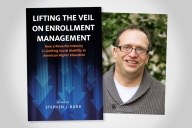You have /5 articles left.
Sign up for a free account or log in.
When several elite universities announced this fall that they were eliminating early admissions programs, they were showered with praise for their commitment to ending the special advantages some applicants had over others.
The universities themselves stressed the issue of equity. Harvard University boasted of creating a "single, later admissions cycle." Princeton University talked about a "single admission process." The University of Virginia said it wanted to send a message that "the playing field is level for all." All three universities said applications would be due in early January and decisions would be announced in early April.
But the playing field still has a bit of a slant. All three universities plan to have some athletes apply early and to notify some of them early -- months in advance of other applicants -- about whether they are going to get in. While the information will fall just short of a formal admissions offer, some applicants will be told that as long as they keep their grades at current levels, they will be assured admission.
Harvard and Princeton will be notifying athletes through the longstanding practice of sending "likely" letters to some athletes shortly after October 1 each year. Under Ivy League rules, such a letter "has the effect of a formal letter of admission provided the candidate continues to have a satisfactory secondary school experience." The University of Virginia will continue the practice of doing early reviews for coaches of recruited athletes and providing information to them, starting quite early in the recruited athletes' senior years of high schools. Coaches may be told that an athlete will be admitted if he or she continues at the current level of academic achievement, is sure to be rejected, or may be admitted under certain circumstances. The University of North Carolina at Chapel Hill, which abandoned early decision several years ago and like Virginia is a member of the Atlantic Coast Conference, has a similar policy.
The universities involved -- except in meetings with coaches concerned about losing the early admissions recruiting hook -- have not publicized the fact that some students will continue to apply and be notified early. A recent column in Inside Higher Ed noted that The Harvard Crimson, the student paper, had reported on the continuation of "likely" letters there. The article quoted one athlete who had received a "likely" letter as calling the system "completely biased" to help athletes. Harvard officials confirmed that 80-100 such letters go out each year and that they are viewed as necessary to compete with universities that -- unlike Ivy institutions -- offer athletic scholarships and want applicants to commit to them.
Cass Cliatt, a spokeswoman for Princeton, said that "particularly with student-athletes, Princeton has used the vehicle of the 'likely letter' for many years, and we expect to continue to do so to support our coaches. It's also possible that the university might consider expanding this practice beyond scholar-athletes in cases that we want to ensure that a student thinks seriously about Princeton." She added that Princeton officials "recognize that sending out a significant number of these would defeat the purpose of ending early decision, and that is not our goal."
Jeffrey H. Orleans, executive director of the Ivy League, said that "likely" letters have long been seen as an important part of recruiting athletes for his member institutions, although only a minority of athletes receive them. "It allows the school to say something in a binding way to a student who has an admissions and letter of intent offer in Division I and wants to know that opportunities at an Ivy school are clear," he said.
From a practical perspective, he said, coaches need to start filling their squads and to know that certain of their recruits will be admitted.
He also said that the rationale behind early notification for athletes is the same logic put forth by defenders of early decision as an option for non-athletes: "If you have a clear match," he said, applicants and admissions offices can both know that the issue is resolved.
As to whether it is fair for athletes to have an option for early notification that other students don't, Orleans noted that "likely" letters have always been sent even earlier than early decision, so athletes had an early option under the old system, too.
At North Carolina and Virginia, the process involves the admissions office telling the coaches about the chances of an applicant getting in, and the coaches may share that information with the recruited athletes.
Jack Blackburn, dean of undergraduate admissions at Virginia, said that no changes were planned in the way athletes are evaluated there now that early decision will no longer be offered as an option. Virginia looks at "pre-applications" as early as the summer before an athlete's senior year in high school. The pre-application will include a transcript, SAT scores, information about the high school attended, and a statement by the Virginia coach. Based on that review, coaches will be told that the student will be admitted if grades are maintained, stands no chance at admission or is a "yes, but." As examples of the latter category, Blackburn said that coaches may be told that a given student would be admitted with another year of math, or if foreign language isn't dropped during the senior year of high school.
An advantage of these early reviews is that Virginia can influence the choices a student makes in the last year of high school, Blackburn said.
He added that while he may tell a coach that a given student will be admitted, the coach may or may not share that information with the applicant. If the applicant is a coach's third choice for a specific slot on a team, the coach may first find out whether the first or second choices can get in and accept Virginia's offer. In other cases, Blackburn said, the applicant is so strong that he or she will be admitted regardless of a coach's needs.
In other cases, applicants other than athletes may get an early read on whether they will be admitted, and this practice will also continue, Blackburn said. About 600 of the 6,000 applicants Virginia admitted this year received letters in January through March, well before the formal notification period, telling them that their chances were very good and encouraging them to get any information they needed. Such letters go out to those at the top of the pool -- either academically or for other reasons, such as adding diversity to the class, Blackburn said. He said that the only case in which such an applicant would get rejected would be if he or she had an academic record that deteriorated during the senior year of high school.
The "likely" letters point out that early decision has an athletic role, not just an educational one. Defenders of early decision like to talk about how it can allow applicants to have peace of mind and assure a college of a broad range of talented students. When you press a president of a college with early decision about why the institution isn't following Harvard's lead, the public answers focus on fit and balancing a class. Privately, some liberal arts colleges leaders will say that athletics is another key reason and that they need some way to match themselves up early with athletes.
The New England Small College Athletic Conference consists of elite liberal arts colleges that all have early decision. Like their Ivy League counterparts, NESCAC institutions do not award athletic scholarships. The institutions are well known -- "notorious" in the words of one person familiar with athletic recruiting -- for using early decision to go after athletes. To date, NESCAC institutions have not shown any interest in moving away from early decision.
"The general phenomenon is that athletics is always connected to the early programs. That's a place where the numbers of students really matters," said Christopher Avery, a professor of public policy at Harvard University and co-author of The Early Admissions Game: Joining the Elite.
He said he could understand why coaches would want to continue to have de facto early admissions, even while their colleges say that they are eliminating it. "If I was an athlete thinking about Harvard and Princeton and couldn't get a gauge from them on where I stood, I'd go elsewhere," he said. So he said that while from "a practical sense," it made sense for colleges to keep sending "likely" letters, it was "fishy" in the context of the statements colleges have made about eliminating early admissions.
What it all adds up to, he said, is more evidence that -- in Ivy League as well other big-time athletic conferences -- the playing field is still not level. "It would be naive for anybody to think that the admissions process for recruited athletes has ever gone by the same rules as the admissions process for anyone else," he said.








